Arts & Entertainment
Pride march brings gayborhood boom years back to Chelsea
‘We will continue what began 50 years ago, to bring us closer to equality’
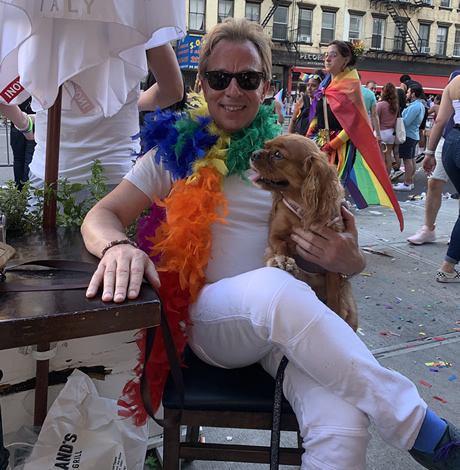
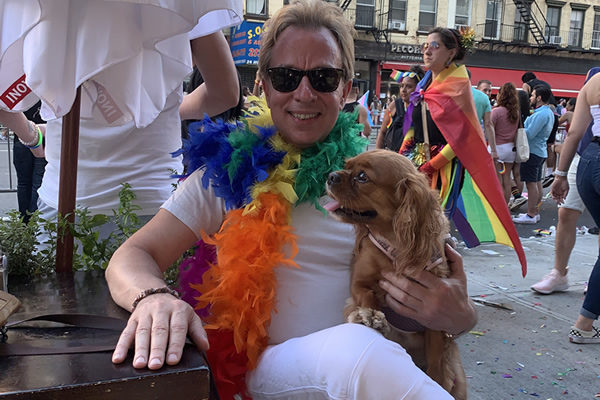
From long lines to get into gay bars to crowded sex shop aisles to sidewalks dense with drag queens, daddies, dykes, twinks, tweakers, and wide-eyed tourists, Manhattan’s onetime ground zero of gayness had a déjà vu moment that lasted all day long, and well into the next, when Chelsea served as the end point of June 30’s NYC Pride March.
Cheered on by an estimated four million spectators, the March proceeded down Fifth Avenue from its East 26th Street kick-off, went past the Stonewall Inn during its Greenwich Village phase, then made its way up Seventh Avenue, concluding in the heart of Chelsea.
Twelve hours and 32 minutes after its noon start time, over 150,000 marchers had crossed the West 23rd Street finish line, from which point many remained in the area to congregate on stoops, hold impromptu dance-offs, and scoop up Stonewall 50 T-shirts hawked by vendors who turned side streets closed to vehicular traffic into open-air markets.
Some strolled, many strutted, down Eighth Avenue, between West 14th and 23rd Streets—which, at the height of Chelsea’s gay glory, housed dozens of queer-centric businesses, including gay lifestyle retail mecca Rainbows & Triangles, and The Big Cup—a java joint that served the community as, depending on your pop culture touchstone, the “Cheers” bar, Central Perk, Starbucks, or a brick and mortar Grindr, where hookup prospects were never more than 20 feet away.
By dawn, the streets were clean, and little evidence of the previous day’s record-setting revelry remained, save for the Pride-hued confetti that promises to linger, like Christmas tree needles, as a reminder of the season that came and went.
For longtime locals, the Pride March recalled an era when Chelsea was the reigning queen of NYC gay nightlife, retail, and residency.
“I consider the heyday of the Chelsea gay vibe to be when I moved here [in 1996] to until around 2005,” says 49-year-old Stephen Charles Lincoln, creator/proprietor of The Protein Bakery, a neighborhood fixture since 1999.
WorldPride, Lincoln notes, “was a fantastic reminder” of the heyday, “with the streets filled with gay people of every race, age, and sexual preference.”
While the onetime group fitness director at the predominantly gay David Barton Gym strongly disavows the notion that Chelsea is “over” as a gay neighborhood (“I’m still here,” he quips), Lincoln concedes it “has definitely diluted over the past 10 years.”
Unlike Splash, Rawhide, and View, not every gay bar from Chelsea’s golden age has been consigned to history.
Sixty-year-old Derek Danton, “an out business owner for 40 years, 20 with the Eagle NYC,” says there is “really nothing in my history to compare to the events of the last two weeks. Locals and visitors alike were just happy to be alive, happy to be free to express themselves, unconditionally.”
Located at West 28th Street and 11th Avenue since 2001, and one of the only Manhattan gay bars with a roof deck, the Eagle is set to mark its 50th anniversary next year.
“In its storied history,” Danton notes, “the size of the crowds at the Eagle, because of WorldPride, is unprecedented… It is astonishing to realize that so many thousands of visitors from all around the world know and love the Eagle, and that tradition is still valued.”
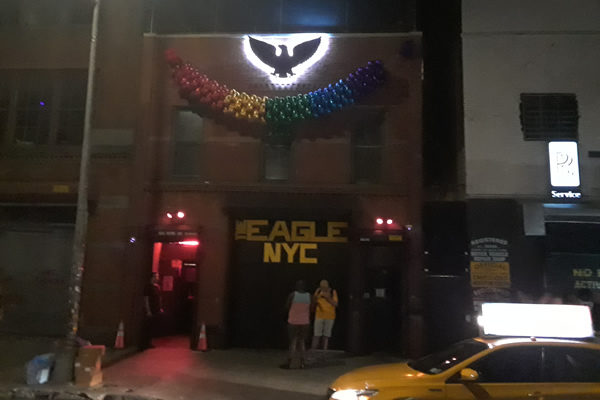
Andrew Rai, 38, a lifelong resident of Chelsea, talks of vanishing tradition, noting he feels the March “retains some of the rapidly fading cultural authenticity” of his neighborhood.
“Chelsea,” Rai says, “was very gay when I was growing up, was very vibrant, in terms of the variety of personalities, genders, and thoughts. Now, it’s becoming very homogenized. But this really harkened me back to when Chelsea was truly diverse. It makes me feel that there’s still some element of it, somewhere, that lives.”
Fifty-one-year-old Craig M. de Thomas, a partner in the Midtown-based commercial and residential title insurance company, Insignia National Title Agency, recalls “telling my grandmother I was gay when I was 25 years of age,” and often traveling “from upstate New York, to indulge in the gay life that is offered here. I have fond memories of going to the many Chelsea clubs, bars, and restaurants, truly enjoying life and always feeling safe and accepted. Seeing men openly sharing affection and being their authentic selves in public was incredible to me. I wanted to be part of that, which is why I moved here 11 years ago.”
Over the last few years, de Thomas observes, “We have seen Chelsea shift, as many gay business owners and residents have moved north [to Hell’s Kitchen].” This year’s Pride celebration, he says, “brought with it a much-needed injection of gayness to Chelsea. It was lovely to walk around over the weekend, both day and evening, and feel the gay energy again, to see restaurants, bars, and shops filled with life and happiness. It was a vibe that is reminiscent of days gone by.”
Calling the Pride March the “culmination of seeds sown decades ago, many of which were planted here in Chelsea by residents who still reside here,” de Thomas sees the neighborhood’s gay liberation greenhouse role as an ongoing one, noting, “We are the fruits” of those seeds and, as such, “will continue what began 50 years ago, to bring us closer to equality” while celebrating “the beauty and power of diversity.”
That Chelsea diversity has legs—four of them, in the form of many locals for whom Sunday’s Parade March intersected with the daily duties of dog ownership.
Chicago-to-NYC transplant Abbey Stolle spoke with the Blade while walking her Shih Tzu, Donna, in close proximity to their residence at 21st Street and Seventh Avenue, where one of the event’s green-shirted volunteers held a sign letting March participants know they were two blocks from the route’s end.
“People want to feel joy. They want to feel love,” she says, of the neighborhood’s sudden population explosion. “I’ve been out here all day. No one I know living here has ever complained [about the crowds brought by the March], and I have a mixed bag in my building—young, old, gay, straight, trans.”
Detroit-born Stolle, 37, spoke with this 52-year-old reporter about his having grown up during the height of the AIDS crisis, and put her own experience within the context of “my era, Matthew Shepard, that fear of coming out in the ’90s. I was a raver for 15 years. Gay men took me under their wing.”
As “a straight white woman,” Stolle notes, “I guess I feel a bit inferior on a day like today. This is a weighted year. These are people,” Stolle said, of the Stonewall-era faces in the March and on the streets, “who’ve lived through so much, who are still living here.”
Clarifying her use of that charged word, Stolle says she did not invoke inferiority “in a negative way. It’s just, it’s not my day. What are my woes compared to some of the strife these people are going through? But I’m a woman, so I get that taste, that sprinkle.”
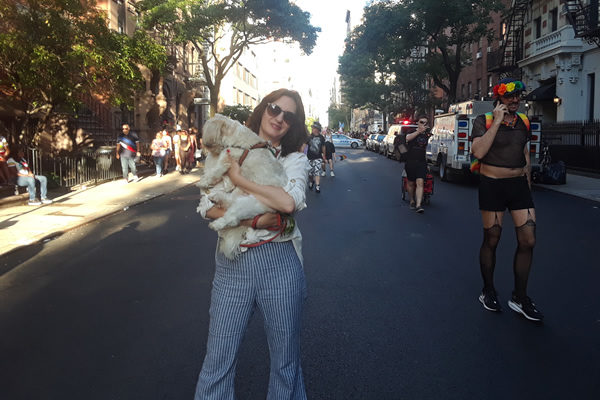
Having watched the day’s events from a table outside Cafe Champignon (Seventh Avenue between West 21st and 22nd Streets), de Thomas recalls, “I stated to my darling friends, gay and straight, as we were sitting in the midst of millions of celebrants, ‘I absolutely love that this is our normal. Isn’t it fantastic?’ ”
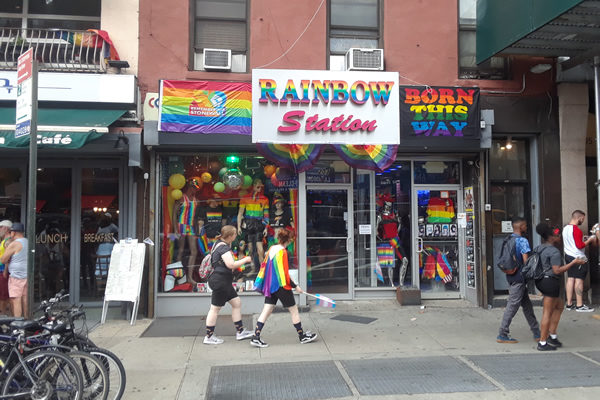
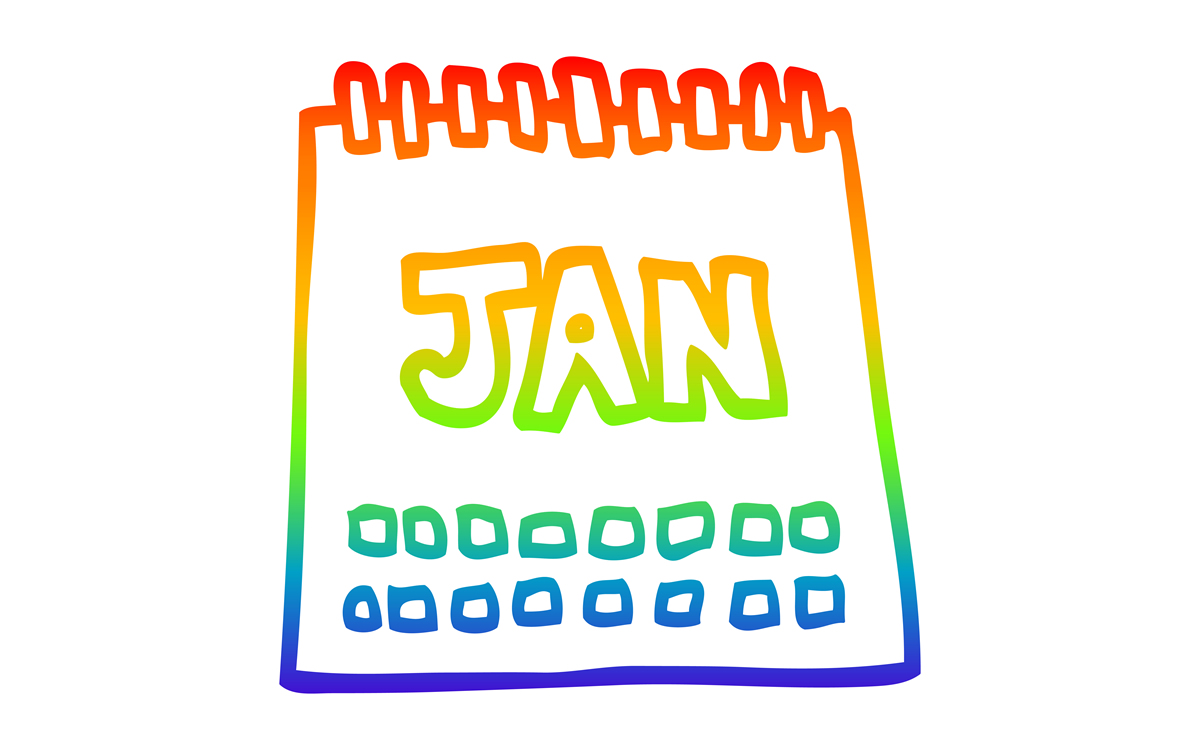
Friday, January 9
Women in Their Twenties and Thirties will be at 8 p.m. on Zoom. This is a social discussion group for queer women in the Washington, D.C. area. For more details, visit Facebook.
“Backbone Comedy” will be at 8 p.m. at As You Are. Backbone Comedy is a queer-run fundraiser comedy show at As You Are Bar DC, where comics stand up for a cause. Each show, a percentage of proceeds go to a local organization – Free Minds DC, a reentry organization for individuals impacted by incarceration. Tickets cost $19.98 and are available on Eventbrite.
Saturday, January 10
Go Gay DC will host “LGBTQ+ Community Brunch” at 11 a.m. at Freddie’s Beach Bar & Restaurant. This fun weekly event brings the DMV area LGBTQ+ community, including allies, together for delicious food and conversation. Attendance is free and more details are available on Eventbrite.
Monday, January 12
“Center Aging: Monday Coffee Klatch” will be at 10 a.m. on Zoom. This is a social hour for older LGBTQ+ adults. Guests are encouraged to bring a beverage of choice. For more information, contact Adam ([email protected]).
Genderqueer DC will be at 7 p.m. on Zoom. This is a support group for people who identify outside of the gender binary, whether you’re bigender, agender, genderfluid, or just know that you’re not 100% cis. For more details, visit genderqueerdc.org or Facebook.
Tuesday, January 13
Coming Out Discussion Group will be at 7 p.m. on Zoom. This is a safe space to share experiences about coming out and discuss topics as it relates to doing so — by sharing struggles and victories the group allows those newly coming out and who have been out for a while to learn from others. For more details, visit the group’s Facebook.
Trans Discussion Group will be at 7 p.m. on Zoom. This group is intended to provide an emotionally and physically safe space for trans people and those who may be questioning their gender identity/expression to join together in community and learn from one another. For more details, email [email protected].
Wednesday, January 14
Job Club will be at 6 p.m. on Zoom upon request. This is a weekly job support program to help job entrants and seekers, including the long-term unemployed, improve self-confidence, motivation, resilience and productivity for effective job searches and networking — allowing participants to move away from being merely “applicants” toward being “candidates.” For more information, email [email protected] or visit thedccenter.org/careers.
The DC Center for the LGBT Community will partner with House of Ruth to host “Art & Conversation” at 3 p.m. at 1827 Wiltberger St., N.W. This free workshop will involve two hours of art making, conversation, and community. Guests will explore elements of healthy relationships with a community-centered art activity. This workshop involves paint, so please dress accordingly. All materials will be provided. For more details, email [email protected].
Thursday, January 15
The DC Center’s Fresh Produce Program will be held all day at the DC Center for the LGBT Community. People will be informed on Wednesday at 5 p.m. if they are picked to receive a produce box. No proof of residency or income is required. For more information, email [email protected] or call 202-682-2245.
Virtual Yoga Class will be at 7 p.m. on Zoom. This free weekly class is a combination of yoga, breathwork and meditation that allows LGBTQ+ community members to continue their healing journey with somatic and mindfulness practices. For more details, visit the DC Center’s website.
Movies
‘Hedda’ brings queer visibility to Golden Globes
Tessa Thompson up for Best Actress for new take on Ibsen classic

The 83rd annual Golden Globes awards are set for Sunday (CBS, 8 p.m. EST). One of the many bright spots this awards season is “Hedda,” a unique LGBTQ version of the classic Henrik Ibsen story, “Hedda Gabler,” starring powerhouses Nina Hoss, Tessa Thompson and Imogen Poots. A modern reinterpretation of a timeless story, the film and its cast have already received several nominations this awards season, including a Globes nod for Best Actress for Thompson.
Writer/director Nia DaCosta was fascinated by Ibsen’s play and the enigmatic character of the deeply complex Hedda, who in the original, is stuck in a marriage she doesn’t want, and still is drawn to her former lover, Eilert.
But in DaCosta’s adaptation, there’s a fundamental difference: Eilert is being played by Hoss, and is now named Eileen.
“That name change adds this element of queerness to the story as well,” said DaCosta at a recent Golden Globes press event. “And although some people read the original play as Hedda being queer, which I find interesting, which I didn’t necessarily…it was a side effect in my movie that everyone was queer once I changed Eilert to a woman.”
She added: “But it still, for me, stayed true to the original because I was staying true to all the themes and the feelings and the sort of muckiness that I love so much about the original work.”
Thompson, who is bisexual, enjoyed playing this new version of Hedda, noting that the queer love storyline gave the film “a whole lot of knockoff effects.”
“But I think more than that, I think fundamentally something that it does is give Hedda a real foil. Another woman who’s in the world who’s making very different choices. And I think this is a film that wants to explore that piece more than Ibsen’s.”
DaCosta making it a queer story “made that kind of jump off the page and get under my skin in a way that felt really immediate,” Thompson acknowledged.
“It wants to explore sort of pathways to personhood and gaining sort of agency over one’s life. In the original piece, you have Hedda saying, ‘for once, I want to be in control of a man’s destiny,’” said Thompson.
“And I think in our piece, you see a woman struggling with trying to be in control of her own. And I thought that sort of mind, what is in the original material, but made it just, for me, make sense as a modern woman now.”
It is because of Hedda’s jealousy and envy of Eileen and her new girlfriend (Poots) that we see the character make impulsive moves.
“I think to a modern sensibility, the idea of a woman being quite jealous of another woman and acting out on that is really something that there’s not a lot of patience or grace for that in the world that we live in now,” said Thompson.
“Which I appreciate. But I do think there is something really generative. What I discovered with playing Hedda is, if it’s not left unchecked, there’s something very generative about feelings like envy and jealousy, because they point us in the direction of self. They help us understand the kind of lives that we want to live.”
Hoss actually played Hedda on stage in Berlin for several years previously.
“When I read the script, I was so surprised and mesmerized by what this decision did that there’s an Eileen instead of an Ejlert Lovborg,” said Hoss. “I was so drawn to this woman immediately.”
The deep love that is still there between Hedda and Eileen was immediately evident, as soon as the characters meet onscreen.
“If she is able to have this emotion with Eileen’s eyes, I think she isn’t yet because she doesn’t want to be vulnerable,” said Hoss. “So she doesn’t allow herself to feel that because then she could get hurt. And that’s something Eileen never got through to. So that’s the deep sadness within Eileen that she couldn’t make her feel the love, but at least these two when they meet, you feel like, ‘Oh my God, it’s not yet done with those two.’’’
Onscreen and offscreen, Thompson and Hoss loved working with each other.
“She did such great, strong choices…I looked at her transforming, which was somewhat mesmerizing, and she was really dangerous,” Hoss enthused. “It’s like when she was Hedda, I was a little bit like, but on the other hand, of course, fascinated. And that’s the thing that these humans have that are slightly dangerous. They’re also very fascinating.”
Hoss said that’s what drew Eileen to Hedda.
“I think both women want to change each other, but actually how they are is what attracts them to each other. And they’re very complimentary in that sense. So they would make up a great couple, I would believe. But the way they are right now, they’re just not good for each other. So in a way, that’s what we were talking about. I think we thought, ‘well, the background story must have been something like a chaotic, wonderful, just exploring for the first time, being in love, being out of society, doing something slightly dangerous, hidden, and then not so hidden because they would enter the Bohemian world where it was kind of okay to be queer and to celebrate yourself and to explore it.’”
But up to a certain point, because Eileen started working and was really after, ‘This is what I want to do. I want to publish, I want to become someone in the academic world,’” noted Hoss.
Poots has had her hands full playing Eileen’s love interest as she also starred in the complicated drama, “The Chronology of Water” (based on the memoir by Lydia Yuknavitch and directed by queer actress Kristen Stewart).
“Because the character in ‘Hedda’ is the only person in that triptych of women who’s acting on her impulses, despite the fact she’s incredibly, seemingly fragile, she’s the only one who has the ability to move through cowardice,” Poots acknowledged. “And that’s an interesting thing.”
Arts & Entertainment
2026 Most Eligible LGBTQ Singles nominations
We are looking for the most eligible LGBTQ singles in the Washington, D.C. region.

Are you or a friend looking to find a little love in 2026? We are looking for the most eligible LGBTQ singles in the Washington, D.C. region. Nominate you or your friends until January 23rd using the form below or by clicking HERE.
Our most eligible singles will be announced online in February. View our 2025 singles HERE.
-

 National4 days ago
National4 days agoWhat to watch for in 2026: midterms, Supreme Court, and more
-

 District of Columbia5 days ago
District of Columbia5 days agoTwo pioneering gay journalists to speak at Thursday event
-

 a&e features5 days ago
a&e features5 days agoQueer highlights of the 2026 Critics Choice Awards: Aunt Gladys, that ‘Heated Rivalry’ shoutout and more
-

 Colombia4 days ago
Colombia4 days agoBlade travels to Colombia after U.S. forces seize Maduro in Venezuela


















